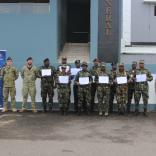Mozambique: Heavy vehicles banned from using the bridge over the Revué
Tanzania “drops” a further 79 Mozambicans in Negomano; SA and Eswatini deport 205 – Carta

File photo: DW
A further 79 Mozambicans were deported from the neighbouring United Republic of Tanzania between 17 and 23 April. According to the National Migration Service (SENAMI), they were “returned” to the country for having entered Tanzania illegally.
At the press conference held in Maputo this Thursday, SENAMI could not say if these people were from Palma, residents of which continue to leave the district headquarters town attacked by terrorists on the 24th March, due to a persistent climate of insecurity.
Tanzania is one of the places chosen by Mozambicans in northern Cabo Delgado for refuge from the terrorist attacks.
On the 5th of April, the United Nations High Commissioner for Refugees ( UNHCR) revealed that a total of 600 Mozambicans seeking asylum had been driven out of Tanzania. The group, which fled the attack in the north of Cabo Delgado province, were “dropped” at the Negomano border post Mueda district, and travelled from there to the district headquarters town at their own risk, some losing their lives along the way.
RSA and Eswatini also deport (205) Mozambicans
Meanwhile, in the south of the country, the deportation of Mozambicans from neighbouring Eswatini and South Africa continues. In the last week (from 17 to 23 April), 205 Mozambicans were deported from these two regional neighbours – 109 from Eswatini and 96 from South Africa.
Of those deported, 126 were returned to the country for illegal immigration and five for committing different types of crimes. Eighty seven Mozambicans were deported across the Ressano Garcia border, nine at Ponta do Ouro, and 109 across the Namaacha border post.
Meanwhile, SENAMI has refused entry into Mozambique of 37 foreign citizens for not meeting the necessary requirements, representing an increase of more than 100% in relation to the similar period of 2020, a period in which there was no registration of refusal to enter Mozambique.
According to the SENAMI spokesman, lack of knowledge of destination (16 cases) and the absence of a work visa corresponding to the reason for travel given (12) were the main reasons for refusal of entry during this period.
By Marta Afonso












Leave a Reply
Be the First to Comment!
You must be logged in to post a comment.
You must be logged in to post a comment.